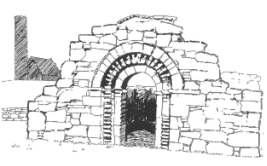Holy Island – Jewel of the Lough.
SKU:
€11.00
€11.00
Unavailable
per item
This is another publication by Gerard Madden. It is a short history of the famous monastic site of Holy Island on Lough Derg in the River Shannon.
The recorded history of the Island dates back to the 6th century when St. Colun mac Cremthainn established a monastery there. The Island is chiefly associated with Saint Caiman who died in 654. His feast day is March 24th.During his time the school of Holy Island became one of the most famous of our ancient seats of learning and drew students not only from remote parts of Ireland but from far-distant countries on the Continent of Europe.
The recorded history of the Island dates back to the 6th century when St. Colun mac Cremthainn established a monastery there. The Island is chiefly associated with Saint Caiman who died in 654. His feast day is March 24th.During his time the school of Holy Island became one of the most famous of our ancient seats of learning and drew students not only from remote parts of Ireland but from far-distant countries on the Continent of Europe.
In 836 the Norsemen, more commonly called the Danes in East Clare, raided the Island. Almost one hundred years later Tomar, son of Elgi, a Norse commander plundered Holy Island and ‘drowned its relics and its books’.
The Island is noted for its early monastic remains. There are six churches, St.Caimin’s, St Michael’s, St Bridget’s. St.Mary’s, St.Colum’s and Teampall na Bhfear nGonta or Church of the Wounded men. This church is associated with the O’Grady sept. There is a magnificent Round Tower, a Holy Well, seven Bullaun stones and the remains of four High Crosses. There is a curious stone called a bargaining stone where deals of every description were performed in times past and woe betides anyone who breaks that deal. Marriage vows are now renewed here. There is an ancient cemetery dating from the eight century, which is unique in Europe because the grave markers are still in their original position.
From the 17th century to the mid 20th century the Island was famous as a center of pilgrimage. During Whit weekend thousands used to flock here to do penance and make atonement for their sins. When the work of penance was finished most would repair to the drinking tents set up around the Island – ‘the penance will take away the guilt and some whisky will wash away the remembrance of it’. The Parish priest proscribed the pilgrimages in 1846.
The Island is noted for its early monastic remains. There are six churches, St.Caimin’s, St Michael’s, St Bridget’s. St.Mary’s, St.Colum’s and Teampall na Bhfear nGonta or Church of the Wounded men. This church is associated with the O’Grady sept. There is a magnificent Round Tower, a Holy Well, seven Bullaun stones and the remains of four High Crosses. There is a curious stone called a bargaining stone where deals of every description were performed in times past and woe betides anyone who breaks that deal. Marriage vows are now renewed here. There is an ancient cemetery dating from the eight century, which is unique in Europe because the grave markers are still in their original position.
From the 17th century to the mid 20th century the Island was famous as a center of pilgrimage. During Whit weekend thousands used to flock here to do penance and make atonement for their sins. When the work of penance was finished most would repair to the drinking tents set up around the Island – ‘the penance will take away the guilt and some whisky will wash away the remembrance of it’. The Parish priest proscribed the pilgrimages in 1846.


